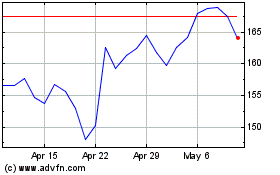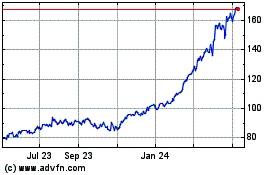By Joshua Jamerson, Andrew Duehren and Natalie Andrews
WASHINGTON -- Congress readied to pass an estimated $2 trillion
stimulus package aimed at combating the economic consequences of
the coronavirus pandemic, hours after legislative leaders and the
Trump administration struck a deal.
The Senate plans to vote on the mammoth bill on Wednesday,
though full text hasn't been released. The legislation will provide
direct financial checks to many Americans, drastically expand
unemployment insurance, offer hundreds in billions in loans to both
small and large businesses, and extend additional resources to
health-care providers.
"This is a wartime level of investment into our nation," said
Senate Majority Leader Mitch McConnell (R., Ky.) in the early hours
of Wednesday after the two sides had reached a deal. "The men and
women of the greatest country on Earth are going to defeat this
coronavirus and reclaim our future."
House Speaker Nancy Pelosi (D., Calif.) told reporters Wednesday
that she is "optimistic" about the legislation, and said no
decision had been made about when the House would try to take up
the legislation if it clears the Senate as expected.
The House is expected then to attempt quickly to pass the bill
by unanimous consent, a procedure that enables the chamber to
approve the legislation without lawmakers being present to vote. An
objection from even a single member could slow the process. House
lawmakers are currently on recess and scattered across the
country.
Treasury Secretary Steven Mnuchin, who has led negotiations on
behalf of the White House, said he had spoken to President Trump
about the agreement and that Mr. Trump would absolutely sign it as
it is written today.
While the final terms of the bill remained under wraps early
Wednesday, the legislation is expected to provide for one-time
checks worth $1,200 to many Americans, with $500 available to
children, with the assistance capped above certain income
levels.
Those payments would be in addition to a broad expansion in
unemployment benefits, which would be extended to nontraditional
employees, including gig workers and freelancers, that Senate
Minority Leader Chuck Schumer (D., N.Y.) had pushed for, according
to a Democratic aide familiar with the negotiations. The agreement
is also set to increase current unemployment assistance by $600 a
week for four months.
The Senate is also poised to approve $350 billion in loans to
small businesses in an effort to keep Americans on payrolls as
economic activity across the country comes to a standstill.
A major challenge in the negotiations was roughly $500 billion
in corporate aid, much of which will go toward backstopping Federal
Reserve loans. The Treasury Secretary will have the authority to
directly lend a slice of those funds, and Democrats had sought to
place controls on the money. The agreement will create a new
inspector general and oversight board to monitor the aid.
The corporate aid portion also includes $17 billion for
assistance to companies deemed to be crucial to national security,
which could include firms such as Boeing Co. and General Electric
Co.
""You can imagine there's an awful lot of companies that can
qualify for that," Sen. Pat Toomey (R., Pa.) said about that
national-security fund, adding it should not be thought of as
specifically for Boeing. A draft of the bill text doesn't name any
specific companies.
Boeing has been seeking at least $60 billion in public and
private aid for itself, its suppliers and the broader aerospace
industry.
The legislation will also invest $150 billion in the health care
system, which is already straining to respond to the quickly
expanding number of infections across the country, and send $150
billion to state and local governments saddled with costs related
to the virus, Mr. Schumer told Senate Democrats Wednesday
morning.
Mr. Schumer said the legislation included a ban on stock
buybacks for any company receiving a government loan from the
stimulus package. The ban lasts the term of the government
assistance plus one year.
Democrats also secured a provision in the agreement that bans
businesses controlled by President Trump, the vice president,
members of Congress and heads of executive departments from
receiving loans or other funds from the stimulus bill. Children and
spouses of those people are also banned, according to a senior
Democratic aid.
Republican senators appear to be on board with the changes.
"The bill will be very similar to what we proposed a few days
ago, but with some more money that is regrettably going to be
necessary to respond to this crisis and help keep our people safe.
And ultimately get our economy back on its feet," Sen. Tom Cotton
(R., Ark.) said on Fox News on Wednesday.
Once the bill passes the Senate, as expected, it will then go to
the House, where Mrs. Pelosi has said that she wants to pass
without having to recall members back to Washington from their
districts for a floor vote.
Many lawmakers are wary about traveling and being exposed to
coronavirus, and several are in self-quarantine and won't be able
to travel. Two House lawmakers and one senator have tested positive
for the virus.
House Democrats must still review the bill, and some House
Republicans are wary about the bill's increase in the federal
budget deficit and the rushed process by which it was drafted.
Swift passage of the $2 trillion package would be the third time
a deeply divided Congress had acted to pass legislation responding
to the coronavirus pandemic in recent weeks. Lawmakers also quickly
passed an $8.3 billion bill funding vaccine development efforts,
among other issues, and a bill expanding paid-leave measures that
was estimated to cost more than $100 billion.
Write to Joshua Jamerson at joshua.jamerson@wsj.com, Andrew
Duehren at andrew.duehren@wsj.com and Natalie Andrews at
Natalie.Andrews@wsj.com
(END) Dow Jones Newswires
March 25, 2020 12:49 ET (16:49 GMT)
Copyright (c) 2020 Dow Jones & Company, Inc.
GE Aerospace (NYSE:GE)
Historical Stock Chart
From Mar 2024 to Apr 2024

GE Aerospace (NYSE:GE)
Historical Stock Chart
From Apr 2023 to Apr 2024
